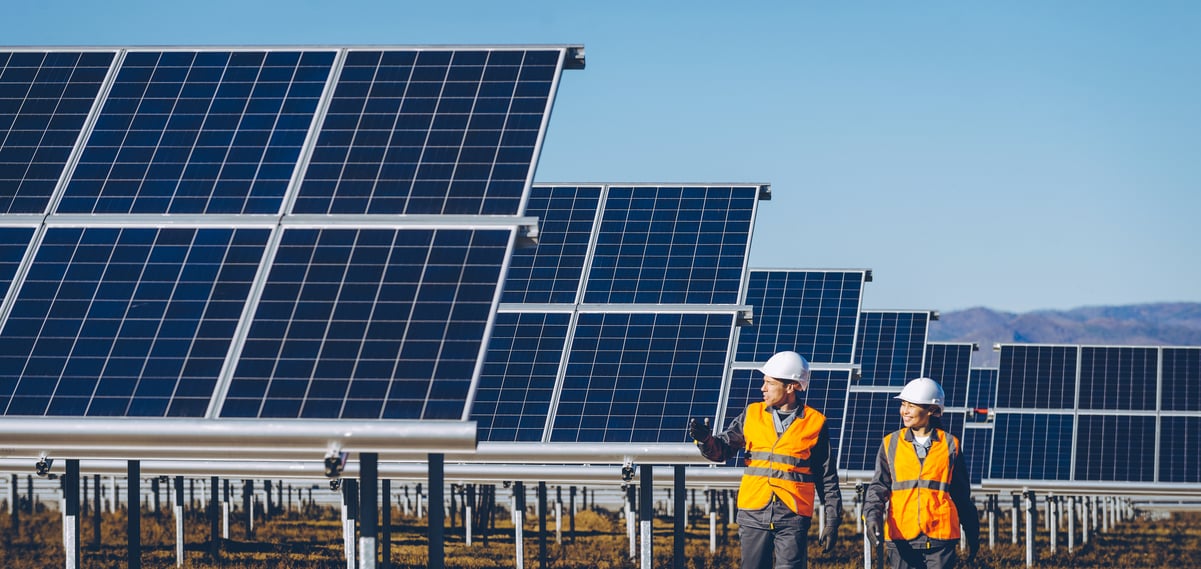The tear solar stocks have been on in the past week was started by President Donald Trump's comments about solar panels being used on the border wall with Mexico. The solar wall could be a big source of demand for the solar industry if it's ever built, which would be nice, but the bigger impact could be from Donald Trump pushing for positive policies for the industry.
It would make sense for Trump to be a fan of solar. It's a growing industry that employs more people than coal mining and oil drilling, so it's one of the few booming industries in the economy today. But if you want to see what could drive Trump's opinion of the solar industry, you should look at how the military -- and his beloved generals -- look at solar energy. Because he's likely to believe what they have to say.

Image source: SunPower.
The Generals love solar energy
Concepts like climate change and renewable energy aren't political topics in the military, they're risks and opportunities that are objectively evaluated. A recent report from Harvard Business Review called Managing Climate Change: Lessons from the U.S. Navy covered in depth how the United States Navy, in particular, is viewing the military risks of climate change over a multi-decade timeframe. Risks from the Department of Defense's Quadrennial Defense Review in 2014 are enormous:
The pressures caused by climate change will influence resource competition while placing additional burdens on economies, societies, and governance institutions around the world. These effects are threat multipliers that will aggravate stressors abroad such as poverty, environmental degradation, political instability, and social tensions -- conditions that can enable terrorist activity and other forms of violence.
That's one of the reasons the military sees climate change as an important risk, and why alternative and renewable energies are a great way to mitigate that risk. If key oil suppliers break out into a war it would be lower risk for the military to be running its operations on homegrown wind or solar energy. The Department of the Navy alone has signed 1.2 GW of renewable energy contracts, which is enough to power 197,000 homes, and it's not the only branch buying clean, homegrown renewable energy.
SunPower (SPWR +0.00%) has built over 100 MW of solar farms at 33 government sites, including a 28 MW solar plant at Vandenberg Air Force Base in California, a 12.5 MW plant at the U.S. Army's Redstone Arsenal in Alabama, and 28.2 MW of solar at Nellis Air Force Base in Nevada. First Solar's (FSLR +0.67%) supplied 120 MW of modules for solar power plants at Elgin Air Force Base, Holly Naval Base, and Saufley Naval Base. These are just a few of the renewable energy plants the military has providing power, but they show the interest and scale of the opportunity for solar companies.
Why Trump's opinion of solar is a big deal
I give this military data as context for the discussion happening in solar energy today. Donald Trump has long spoken negatively of wind and solar energy, even questioning if they work. But if he thinks solar energy is a good option for the wall with Mexico and has generals in his ear talking about how wind and solar are good for the military, it's possible he could be persuaded to look positively on the industry.
That's particularly important in 2017 because later this year he could be asked to decide if he's going to put punitive tariffs on the solar industry that the industry itself says could result in 47 GW less solar installed, 88,000 lost jobs, and billions less in economic activity.
For solar investors, a negative ruling on the trade case could crater solar stocks overnight. If Trump is going to be convinced that tariffs on solar panels are bad for the U.S., his generals might be the ones who convince him to keep this industry alive.






